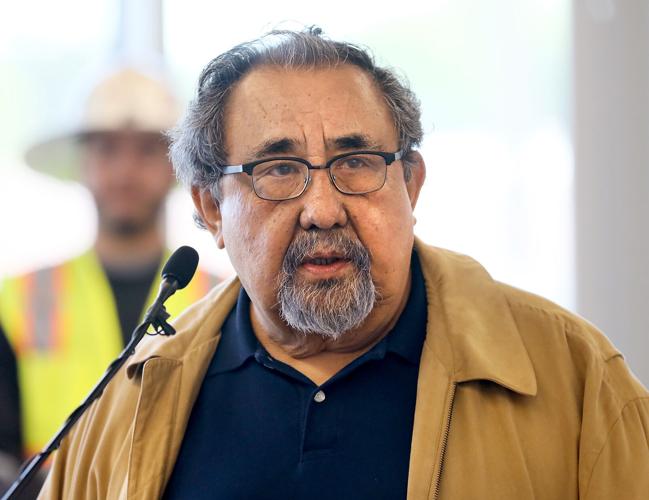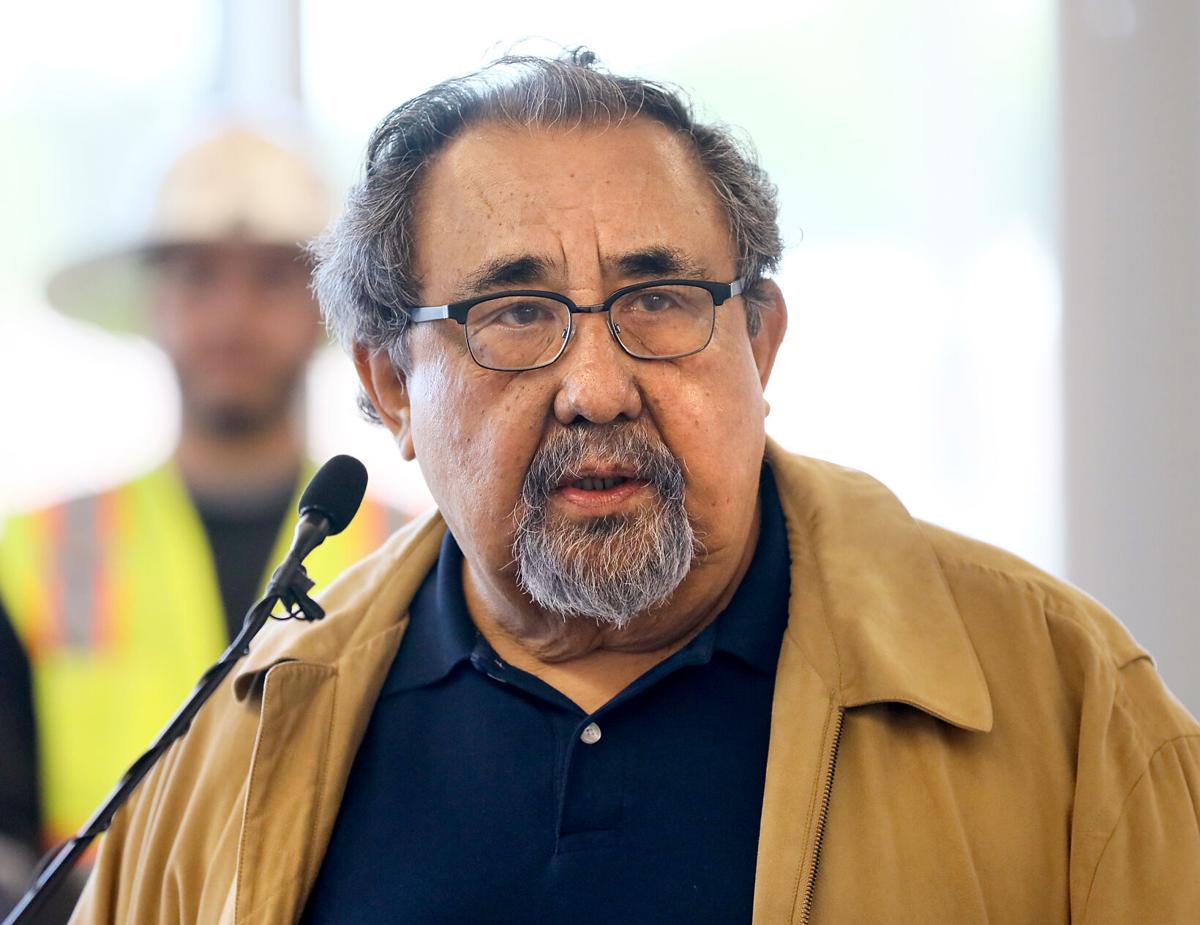Immigration, climate policy and the economy were on the table during a bipartisan talk this week between two Southern Arizona U.S. congressmen.
Long-time Democratic Rep. Raúl Grijalva and first-term Republican Rep. Juan Ciscomani were back in their Tucson home district for Congress’ August recess. Both committed to an informed policy discussion that focused on core issues.
Ciscomani, who took office in January, said he and Grijalva talked by phone soon after he was elected.
“We know we’re going to be on different ends of the political spectrum, and we’re going to disagree more than agree on policy issues,” he said. “But we also talked about keeping it civil, never going personal and just sticking to the issues.”

Ciscomani
The hour-long discussion Tuesday was held at Pima Community College’s Aviation Technology Center at Tucson International Airport. It was moderated by Karla Morales, board chairwoman of the Tucson Hispanic Chamber of Commerce, which organized the event.
The congressmen found common ground on a number of points, including the need for movement on immigration bills that have broad public support, investments in security technology at ports of entry, and programs that promote sustainability and clean energy.
“Being for growth doesn’t mean you’re against the climate” policies, Ciscomani said. He said Southern Arizona could be a “climate tech hub.”
Grijalva said recent natural disasters highlight the devastating impact of climate change and the urgent need to transition away from fossil fuels. The sooner the government acts, the better, he said.
“We can do it in a pragmatic, smart way or we can do it in a painful, costly way,” Grijalva said. “I think there’s a level of boldness that everyone is afraid to deal with on the issue of climate, that we shouldn’t be shy about. … Our opportunities for development shrink as the climate continues to change.”
Ciscomani highlighted a number of environment-focused projects — including more funding to clean up “forever chemicals” in Tucson’s water — that came out of the House Appropriations Committee, of which he is the only freshman member.
“There may be a misconception that my side of the aisle may not see it (protecting the environment) as an issue,” he said. “I can’t speak for everyone, but I do. I think we have a great opportunity here of becoming a climate tech hub and being able to reinvigorate that industry.”
Immigration reform
Grijalva said it’s unlikely Congress will achieve much-needed comprehensive immigration reform anytime soon.
“It’s a painful acknowledgement on my part. This has been, in my career in Congress, the most vexing, difficult, politically charged and complex issue that I deal with,” he said.
But at a minimum, he said, Congress should focus on passing the “low-hanging fruit”: legislation that is widely popular among the electorate. That includes the Dream and Promise Act of 2023, which would give long-term stability to DACA recipients, or “Dreamers,” undocumented immigrants who were brought into the country as children.
Dehumanizing rhetoric about immigrating people — such as the racist “replacement theory” and terminology like “invasion” — further degrades the debate, Grijalva said.
Ciscomani said the immigration issue is personal to him; he moved to the U.S. from Hermosillo, Sonora with his family in the 1990s and became a naturalized U.S. citizen 14 years later. He was also pessimistic about the possibility of comprehensive immigration reform in this Congress.
“Given the (political) environment today, I think trying to do this in a large comprehensive way poses serious challenges that I don’t see that moving forward,” he said. “What we need to do is take separate bites at the apple and deal with issues we can fix now.”
To address labor shortages in the agricultural and food industries, Ciscomani highlighted the Hire Act, which would streamline work-visa applications and renewals for farmworkers and other temporary workers, and increase work visa caps for the H-2A and H-2B programs.
By improving legal channels for immigration, Congress can “disincentivize the wrong way of doing it,” he said.
A June policy analysis from the libertarian think-tank Cato Institute, titled “Why Legal Immigration is Nearly Impossible,” said less than 1% of people who want to move permanently to the U.S. have a legal path to do so.
Ciscomani agreed with Grijalva that DACA recipients need a pathway to citizenship.
“I see myself reflected in them, seeing that desire for opportunity, that desire to pursue the American dream,” Ciscomani said. “I meet their parents and I see my parents in them. … We have to do better for them, and we have to be better for our businesses.”
Grijalva said border enforcement should be “laser”-focused on security issues like fentanyl smuggled through officials ports of entry.
“Eighty percent of the interdictions happen at the ports of entry,” he said. “Why aren’t we investing in those (ports of entry), in both security and technology?”
Arizona’s proximity to the Mexican border is an “amazing asset for our community … not a liability,” Ciscomani said, pointing to the more than $17 billion in annual trade with Mexico and the 228,000 Arizona jobs that depend on trade between the U.S., Mexico and Canada.
Budget debate
The U.S. Congress must finalize a budget bill by Sept. 30 to avoid a government shutdown. Ciscomani expressed optimism about reaching a budget deal without resorting to a temporary “continuing resolution” to buy more time before the government shuts down.
“This is maybe the freshman in me saying, ‘We can get it done,’” he said. “We’re going to need to think outside the box. We’re going to need to think creatively on how we deal with this $33 trillion in debt and growing.”
Grijalva said the Republican Freedom Caucus members have made demands that will make it hard to agree on a temporary continuing resolution, let alone a budget bill.
“A government shutdown hurts everybody,” he said.
Get your morning recap of today's local news and read the full stories here: http://tucne.ws/morning






